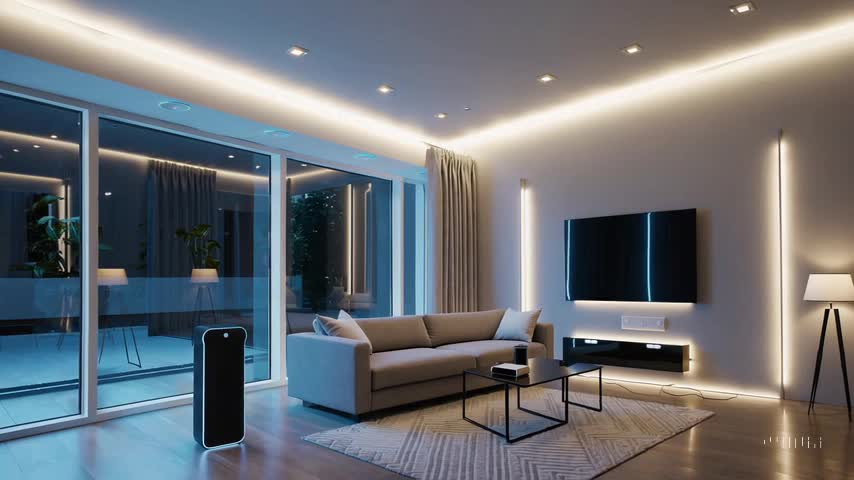The Rise of Smart Home Technology and its Impact on Tenant Satisfaction

The real estate industry is undergoing a digital transformation, driven by the rapid adoption of technology. Smart home devices, once a luxury, are rapidly becoming commonplace, revolutionizing the tenant experience and presenting both challenges and opportunities for property managers. This article will explore how the integration of smart home technology impacts tenant satisfaction and how property managers can leverage these advancements to enhance the value proposition of their properties.
Smart Home Technology: Transforming the Living Experience
Smart home technology encompasses a wide range of interconnected devices and systems that enhance convenience, comfort, and security. Key examples include:
- Smart Locks: Offering keyless entry via mobile apps, enabling remote access, and providing granular control over access permissions.
- Smart Thermostats: Allowing tenants to control their indoor temperature remotely, optimizing energy consumption, and creating a more comfortable living environment.
- Smart Lighting: Enabling automated lighting control, enhancing security, and creating personalized ambiance.
- Smart Appliances: Integrating appliances like refrigerators, washing machines, and dryers with smart home systems for enhanced convenience and energy efficiency.
- Home Security Systems: Offering enhanced security features such as motion sensors, smoke detectors, and security cameras, providing tenants with peace of mind.
Enhanced Tenant Satisfaction:
The integration of smart home technology offers numerous benefits for tenants, leading to increased satisfaction and a more enjoyable living experience:
- Convenience: Smart home devices offer unparalleled convenience, allowing tenants to control their living environment remotely through mobile apps or voice commands.
- Comfort: Smart thermostats, lighting systems, and air quality sensors create a more comfortable and personalized living environment.
- Security: Smart locks, security cameras, and other security features provide enhanced peace of mind and a greater sense of safety.
- Energy Efficiency: Smart home devices can help reduce energy consumption, leading to lower utility bills and a smaller environmental footprint.
- Control and Personalization: Tenants have greater control over their living environment, allowing them to personalize their space to their specific needs and preferences.
Leveraging Smart Home Technology for Property Managers
Smart home technology also offers significant benefits for property managers:
-
Improved Operational Efficiency:
- Remote access and control can streamline maintenance tasks and reduce the need for on-site visits.
- Predictive maintenance can be enabled by monitoring data from smart sensors, allowing for proactive maintenance and minimizing disruptions.
-
Enhanced Tenant Communication:
- Smart home platforms can facilitate communication between tenants and property management, enabling faster response times and improved issue resolution.
-
Data-Driven Insights:
- Smart home devices generate valuable data that can be analyzed to improve building operations, enhance tenant satisfaction, and optimize energy consumption.
-
Increased Property Value:
- Properties equipped with smart home technology are increasingly in demand, attracting tech-savvy tenants and commanding higher rents.
Challenges and Considerations
While the benefits of smart home technology are significant, there are also challenges to consider:
- Data Privacy and Security: Ensuring the security of tenant data and protecting against cyber threats is crucial.
- Technical Support: Providing adequate technical support to tenants in navigating and utilizing smart home technology is essential.
- Accessibility and Equity: Ensuring that all tenants have access to and can benefit from smart home technology is crucial to avoid creating further inequalities.
- Cost of Implementation: Integrating smart home technology can involve significant upfront costs for property owners.
The Future of Smart Home Integration
The integration of smart home technology in the property management industry is still in its early stages. As technology continues to evolve, we can expect to see even more innovative solutions that enhance the tenant experience and streamline property management operations.
Conclusion
Smart home technology is rapidly transforming the real estate landscape, offering significant benefits for both tenants and property managers. By embracing these advancements, property managers can create more attractive and convenient living environments, enhance tenant satisfaction, and gain a competitive edge in the market. However, it is crucial to address the challenges associated with data privacy, security, and accessibility to ensure that the benefits of smart home technology are equitably distributed and that the tenant experience is enhanced, not compromised.
Disclaimer: This article provides a general overview of the impact of smart home technology on the property management industry. Actual experiences and outcomes may vary.
This article is for informational purposes only and should not be considered financial, investment, or legal advice.


